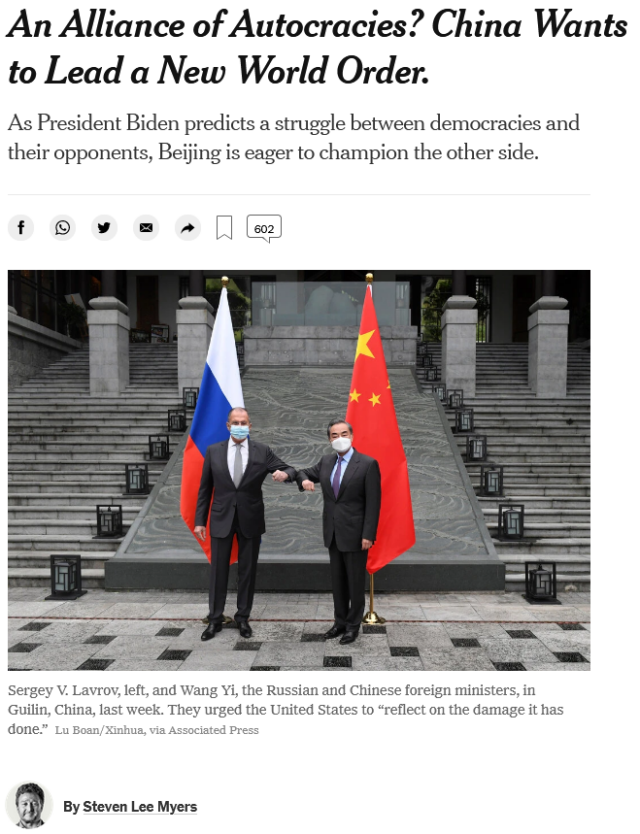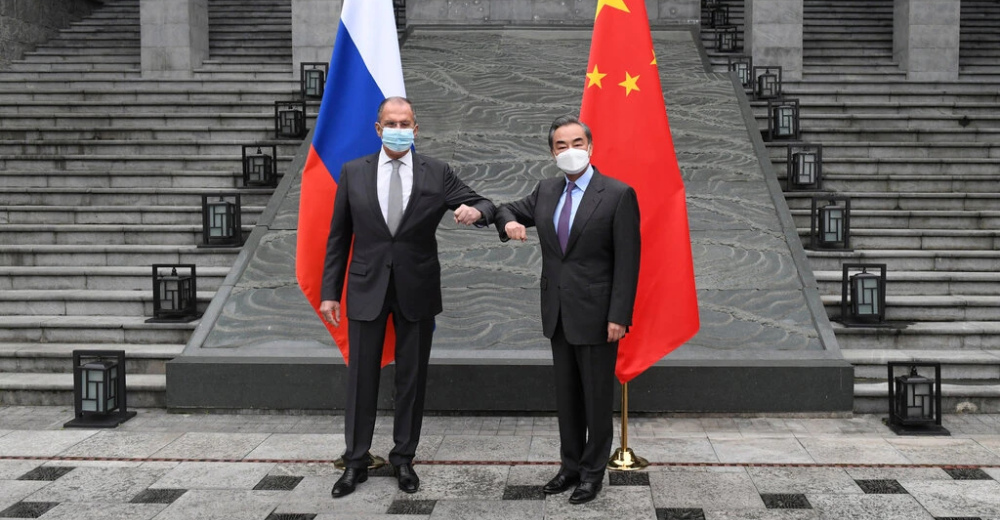Need a Quote from an Official Enemy Denouncing Democracy? Do like the New York Times and Make It Up
MEDIA, 5 Apr 2021
Jim Naureckas | FAIR-Fairness and Accuracy in Reporting - TRANSCEND Media Service
30 Mar 2021 – You know you’re in for a hard sell when the New York Times (3/29/21) publishes an article under the headline “An Alliance of Autocracies? China Wants to Lead a New World Order.”
And Times Beijing bureau chief Steven Lee Myers doesn’t disappoint. He asserts:
China hopes to position itself as the main challenger to an international order, led by the United States, that is generally guided by principles of democracy, respect for human rights and adherence to rule of law.
 The New York Times (3/29/21) produces a new installment in its ongoing project of demonizing China (FAIR.org, 1/29/21): “As President Biden predicts a struggle between democracies and their opponents, Beijing is eager to champion the other side.”
The New York Times (3/29/21) produces a new installment in its ongoing project of demonizing China (FAIR.org, 1/29/21): “As President Biden predicts a struggle between democracies and their opponents, Beijing is eager to champion the other side.”
“Generally” is doing a lot of work in that sentence. I don’t think I have to spend too much time reminding you that the United States is a massive supporter of coups and undemocratic governments; has an ongoing history of torture, detention without trial and extrajudicial killing; and asserts the right to invade and coerce countries in defiance of international law. But it’s what Myers does with this deceptive summary of US policy that I find most striking; he immediately follows with:
Such a system “does not represent the will of the international community,” China’s foreign minister, Wang Yi, told Russia’s, Sergey V. Lavrov, when they met in the southern Chinese city of Guilin.
Wang, like the New York Times, defines the US-led international order as one based in democracy, human rights and the rule of law, and says that doesn’t represent “the will of the international community”? That doesn’t seem likely. When you search for the part of the quote that’s actually in quotation marks, you find this release (3/26/21) from the Chinese government:
Wang Yi said, the so-called “rules-based international order” by a few countries is not clear in its meaning, as it reflects the rules of a few countries and does not represent the will of the international community.
So what Wang actually said China was challenging is the “rules-based international order”—which he suggested doesn’t deserve its name, since only a handful of countries get to make the rules. He didn’t mention democracy or human rights in the statement; as for the rule of law, he said, “We should uphold the universally recognized international law.”
It’s an article of faith in US establishment media that they represent an independent watchdog press, whereas China’s news outlets propagandize the official positions of the state. Articles like this one make you wonder what they’re talking about.
_____________________________________________________
Tags: Anglo America, China, Fake News, Hegemony, Imperialism, New York Times, Russia, USA
DISCLAIMER: The statements, views and opinions expressed in pieces republished here are solely those of the authors and do not necessarily represent those of TMS. In accordance with title 17 U.S.C. section 107, this material is distributed without profit to those who have expressed a prior interest in receiving the included information for research and educational purposes. TMS has no affiliation whatsoever with the originator of this article nor is TMS endorsed or sponsored by the originator. “GO TO ORIGINAL” links are provided as a convenience to our readers and allow for verification of authenticity. However, as originating pages are often updated by their originating host sites, the versions posted may not match the versions our readers view when clicking the “GO TO ORIGINAL” links. This site contains copyrighted material the use of which has not always been specifically authorized by the copyright owner. We are making such material available in our efforts to advance understanding of environmental, political, human rights, economic, democracy, scientific, and social justice issues, etc. We believe this constitutes a ‘fair use’ of any such copyrighted material as provided for in section 107 of the US Copyright Law. In accordance with Title 17 U.S.C. Section 107, the material on this site is distributed without profit to those who have expressed a prior interest in receiving the included information for research and educational purposes. For more information go to: http://www.law.cornell.edu/uscode/17/107.shtml. If you wish to use copyrighted material from this site for purposes of your own that go beyond ‘fair use’, you must obtain permission from the copyright owner.

